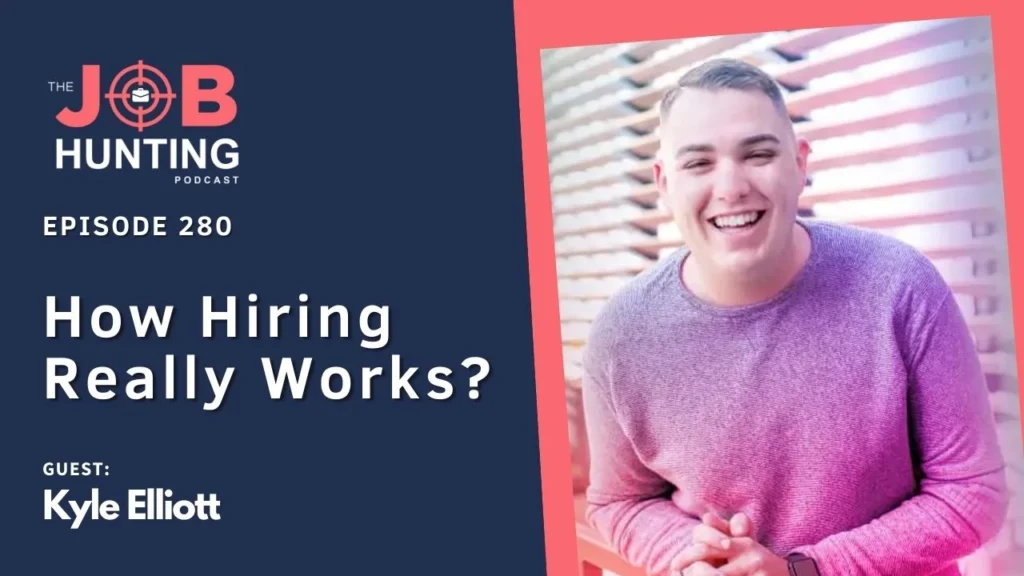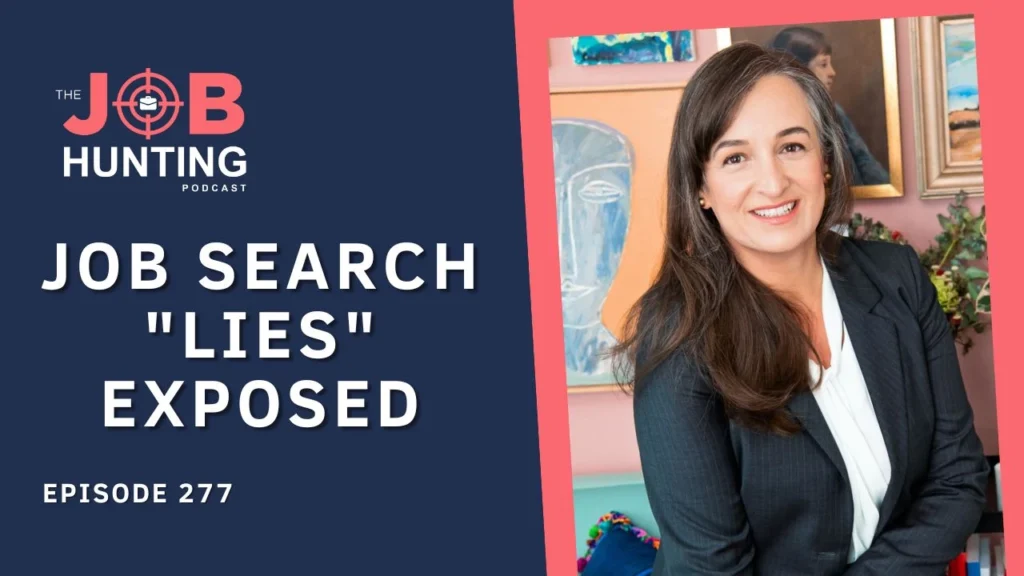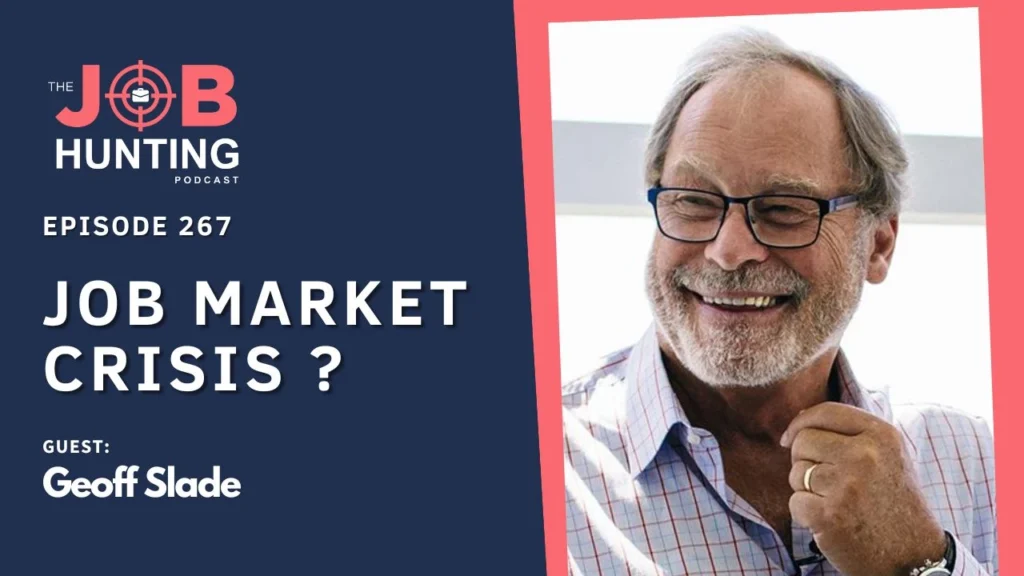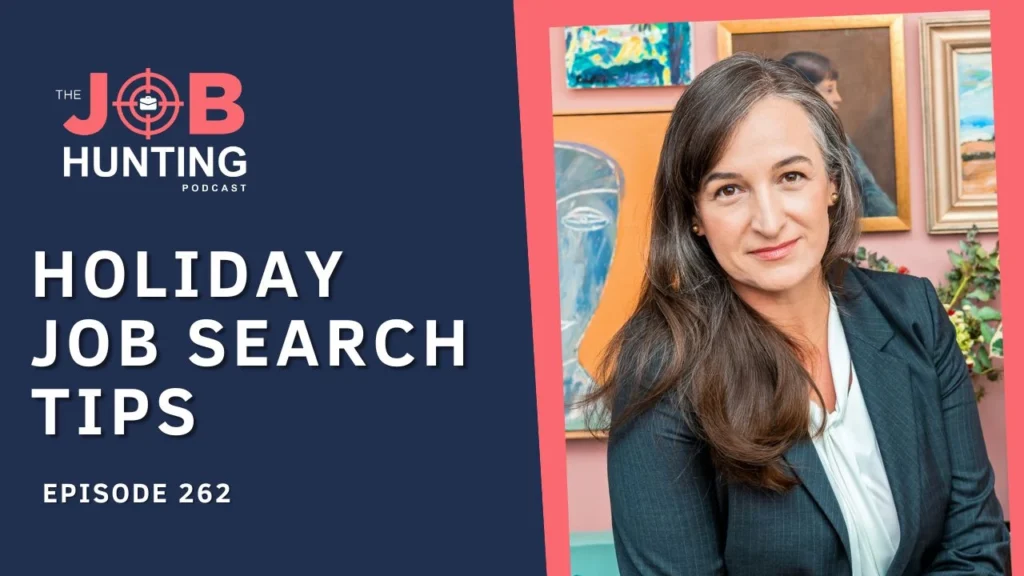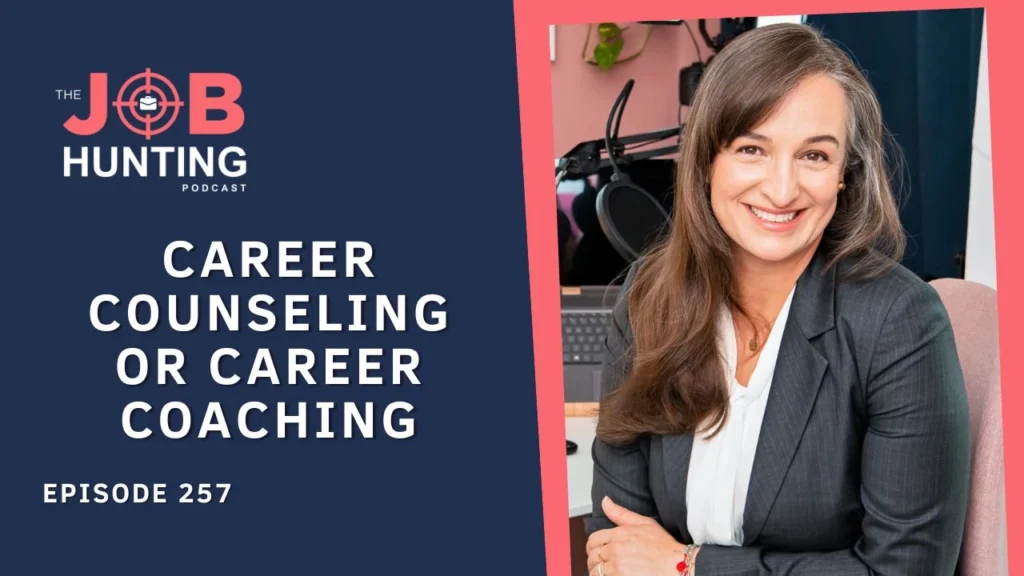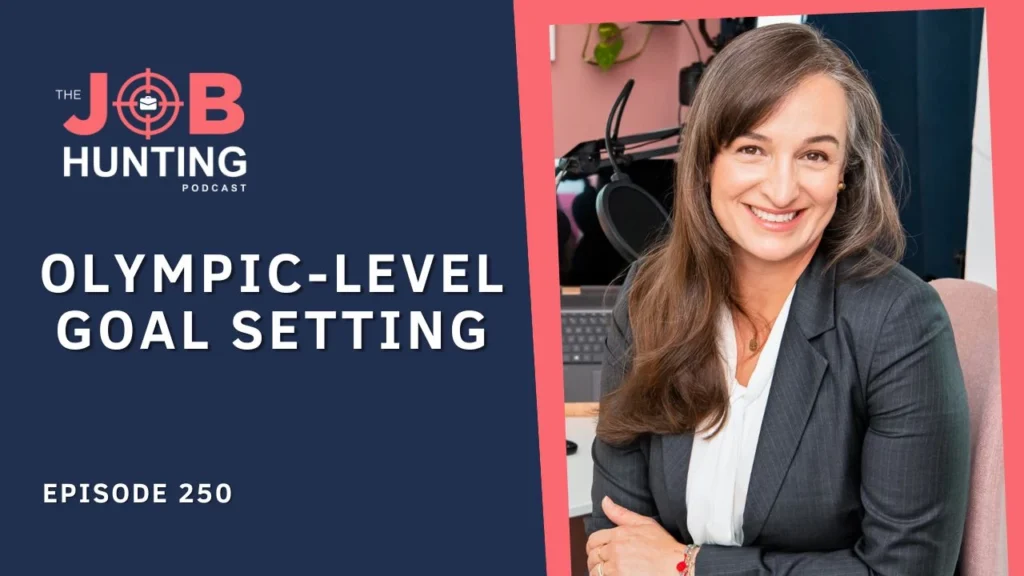Today, I’d like to talk to you about what it means to invest in your career—not just in your job or your professional development, but in your career, your ability to earn a living now and in the future. It is something we sometimes forget to do. Sometimes we delegate it to our employers or to fate, accepting whatever comes our way. However, I believe that taking control of your career is critical to your success at every stage of your life. It will help you feel more secure, happy, confident, brave, and in control of your destiny. Investing in your career, whether you are working in the corporate, nonprofit, or government sectors, whether you are a young professional, an experienced manager, or even a senior executive, is crucial for long-term success and personal fulfillment. I want to make this a chatty, super fun episode.
I have compiled a series of examples to illustrate the points I want to discuss with you. I’ll also sprinkle in some additional episodes of The Job Hunting Podcast in case you want to deep dive into some of these topics, which may require special attention from you. So let’s explore this in more detail, how to do it effectively, and the benefits it will bring to you.
Let’s find out.
You’ve probably heard people say that we all need to embrace lifelong learning, but what does this actually mean for you? One of the key lessons I have learned throughout my career is the importance of lifelong learning. This is not news to you; people talk about this all the time.
The problem is we don’t know exactly how to do it. Even though we know that education shouldn’t stop after we graduate, we need to be constantly evolving in our thinking as professionals, constantly learning new things and upskilling. But what does it mean? How do you incorporate it into your schedule?
That’s the key because if it’s not in your schedule, chances are you’re not going to do it.
Some employers make it easier for us to do continuous learning. For example, Satya Nadella, CEO of Microsoft, has transformed the company by fostering a culture of continuous learning and curiosity. He encourages employees to learn and adapt, which has positioned Microsoft as a leader in cloud computing and AI. Follow him on LinkedIn, read about him, and learn more about what employers do to help their employees and their companies through continuous learning. But you shouldn’t rely on employers to activate this important step in your career. For some of you, lifelong learning comes naturally.
It could be a strength and talent for some; for others, it’s more about building the habit and the discipline needed so that it will pay dividends in the future. Start by reading the news—it’s as simple as that. You should find time every day to read news about your industry, your sector, and your company. How I do it: I wake up in the morning, and after I stretch and meditate a little bit, I get on my phone and read the news. I like to do it in the morning because, due to the work I do, I may need to address something straight away with my clients. There are other ways you can maximize this, using LinkedIn courses, Coursera, Udemy, and other skill courses that you can find online for free. Additionally, active education and professional development need to be well considered in terms of the time and money you will invest in them.
So, don’t jump into professional development. That’s why I make a distinction between career investment and professional development. Professional development is an output of your career decisions. The second thing you need to do is build strong relationships because your network is one of the most valuable assets in your career.
Investing time in building and nurturing your relationships can provide support during tough times, mentorship, and open up opportunities you may not have encountered otherwise. Listen to Episode 239 about reputation, where I discuss this in more detail. I was reminded of Sheryl Sandberg’s book “Lean In” when preparing for this episode. As COO of Facebook, she emphasizes the importance of mentorship and credits her success to the guidance she has received throughout her career.
I think this is especially important for women in the corporate world, but everybody should aim for networking to be incorporated as part of their career investment. Attend industry events—so many people forget to do that once they get a job and settle in. Join professional groups, professional associations, industry associations, and reach out to peers and mentors for advice outside your immediate company. Networking is not just about making contacts but building meaningful relationships that can support your career growth over time. Vice versa, you should be there for them as well, supporting, mentoring, and advising them if they come to you. Then, focus on your personal growth.
Investing in your career isn’t just about acquiring new skills; it’s about personal development because you will mature and develop over time. With that will come a set of soft skills that will become part of your brand, and you will be known for your emotional intelligence or your leadership style.
This will differentiate you in the competitive job market. Again, we discussed this in the reputation episode last week, Episode 239. Go have a listen. Consider the story of Indra Nooyi, former CEO of PepsiCo. Her leadership style was very strategic. She was known for her important business decisions and for her empathy and communication, which showed a strong commitment to her team’s growth. That blend of soft and hard skills helped her and PepsiCo succeed for over a decade. Identifying those soft skills, not just through formal learning but through reflection and understanding who you are becoming as a professional, is really important.
And you need time to think and reflect on those. Stay adaptable. The job market is changing more than we ever envisioned. All the economic shifts, environmental shifts, and tech shifts. It’s important to be adaptable, and this doesn’t come naturally to most of us. This understanding that you need to pivot when necessary, update your skills upon demand, or even present new trends to your employers from time to time.
Think about how IBM has shifted from being a hardware company to a leader in cloud and AI services. This adaptability has allowed IBM to remain afloat in a very competitive tech industry. So this is something you need to consider as well as a professional. If you were originally a great employee for IBM back in the hardware period, how are you going to transition, up-skill, and re-skill for now? These are the things we need to think about for long-term career success—evolving with the market, the industries, and the employers. There’s a great episode for this about personal agility with my friend Marian Ru, which I’ll link in the show notes below.
Seek constructive feedback to develop your career and know where to invest. Don’t shy away from feedback. Regularly seek input from your supervisors, peers, and mentors. You don’t need to always ask them for feedback; just listen to how they are responding to the things you do in the company, and that will give you a clue. Be switched on. Constructive feedback is a powerful tool for your personal and professional growth. It helps you refine your skills and improve your performance over time.
I like the example of Ray Dalio, founder of Bridgewater Associates, who promoted a culture of radical transparency and constant feedback in the organization.
This approach has helped Bridgewater become one of the most successful hedge funds in the world. You can read more about it online. Embracing feedback as an opportunity to learn and grow in an industry that’s really set in its ways was a competitive edge for that company. If you want feedback, be mentored or become a mentor.
Engaging in either coaching or mentorship can incredibly benefit your career. Learning from those with more experience can provide great insights and be valuable in many ways. Mentoring others can also reinforce your knowledge and give you the warm feeling of helping someone else. Warren Buffet and Bill Gates’ mutual mentorship and collegiality have been instrumental in shaping their careers, companies, and philanthropic efforts.
Mentorship is a two-way street for everyone involved. It benefits all parties, fosters a culture of continuous learning and development, and that’s how it should be. One of my favorite examples of coaching is from Atul Gawande, a renowned surgeon and public health researcher.
In his famous TED Talk, “If you want to be great, get a coach,” he shares thoughts about the mentorship and coaching he received from more experienced surgeons. He realized that having a coach could provide that outside perspective invaluable for his development as a professional. That is a TED Talk I recommend everyone watch and understand because there’s no need to reinvent the wheel. You can learn so much from people who are just a few steps beyond you and a bit more experienced than you. I am a coach.
I’m a former corporate professional, a former senior executive, and a former CEO. I have a background in marketing and management. So I have experience that really relates to a lot of my clients. I can put myself in their shoes and understand their challenges, failures, and successes because I’ve experienced them. I have lived experience and exponential growth of experience from my repertoire of clients. So I have much to share with my clients and students. Helping them gain better control of their careers is my purpose in life; it’s what I do. So look at the show notes, find my website, see how I work, and see if now or in the future there is space for you to invest in your career by working with a coach.
Okay, let’s move on. What else do we need to talk about in helping you invest in your career?
Developing your personal brand today is more important than ever. Make sure your LinkedIn profile is up to date, contribute to industry discussions, and showcase your expertise. You can write blogs, give presentations, be part of a panel, and present in-house at your organization or outside at events. Having a robust brand can increase your visibility and credibility, making you stand out to potential employers.
If you are keen on career advancement, mobility, and finding new jobs, it’s important to consider this as part of the repertoire of things you
need to invest time in. Arianna Huffington is a good example of someone who built an interesting personal brand by mixing her interest in wellness with her expertise in media, creating the Huffington Post and now Thrive Global.
Sometimes things can be quite quirky, unique, and authentic to you, but if they make sense, remember that you can embrace them, and there will be a niche and an audience for you. If you want to learn more about personal branding, there is an episode I recommend. I’ll put the link in the show notes below.
Having a strong personal brand is really important, so make sure your LinkedIn profile is up to date, contribute to industry discussions on LinkedIn and at events, write blogs, and join panel discussions both inside your organization and in professional settings. Think about Arianna Huffington, who built her personal brand around her expertise in media and her interest in wellness. Her brand helped her launch first the Huffington Post and then Thrive Global, developing a unique take that blended her expertise and personal interests. That’s something you can do as well—find a niche that is interesting, purposeful, and will excite you over time. There’s an episode about personal brands that I want you to consider.
If you want to dive deeper into this, the link is in the show notes below. A big trend today is prioritizing work-life balance, more important than ever post-pandemic. I have noticed many people changing their ambitions and interests to account for this, changing their lives. It’s easy to get caught up in the hustle, especially before the pandemic, but maintaining a healthy work-life balance is crucial for long-term success, productivity, and personal well-being.
Make sure you have time for whatever you want to do, whether it’s hobbies, relaxation, family, or friends. Having that balance will keep you productive and prevent burnout, which is part of investing in your career. Sometimes it’s just about taking time off. Many companies now understand this and are adapting to this trend, encouraging employees to maintain a better work-life balance, adding flexibility in working hours and wellness programs. These measures keep employees motivated and productive, which is also good for the company.
It’s something you need to consider outside of employer guidelines. What are your professional and personal ambitions? Try to find that balance that moves you toward those goals. If flexibility or hybrid work is more important to you, start establishing career milestones to achieve your goals over time. They won’t just come to you naturally; you need to seek them out, identify them, and work towards them. That means setting clear goals.
Sometimes I work with clients who are confused in the job market because they don’t know what they want. A clear vision, realistic career strategy, and well-defined, planned-out steps will keep you focused and motivated. It will show when you’re in front of people, telling them about you, what you can do for the organization, and your next steps. Look at the career trajectory of visionaries like Elon Musk. He has clear goals for his ventures, like them or not. He is focused, has a vision, and a strategic plan behind it. It’s the key to his success and many other professionals with clear strategies and focus. Adapt that to your needs and personality. You don’t need to be a visionary to have goals.
Everybody should have goals. Take risks. Don’t be afraid to step out of your comfort zone. Calculated risks can lead to significant career advancements and great personal growth, whether it’s applying for a challenging role, putting your hand up for a promotion, starting a new project, a side hustle, or pursuing something entrepreneurial. Embracing risks has rewards and helps you grow.
It helps you identify your soft and hard skills, so include some of that in your life. Steve Jobs is a prime example of a risk-taker who drove innovation that affects everyone around the world. His willingness to take bold steps led to the creation of groundbreaking products. Embracing risk can lead to extraordinary paths. If you want to understand more about risks, I have an episode listed below for you.
With risks, you have to embrace failure. If you’re going to take risks, understand that failure should not be considered negative but part of life. It’s inevitable in any career journey. Instead of fearing failure, view it as a learning opportunity, part and parcel of success. Each setback provides a lesson to help you grow, improve, and innovate next time. You become more resilient, experienced, and mature. Wisdom comes from perseverance facing failure, leading to great success. Thomas Edison famously said, “I have not failed. I’ve just found 10,000 ways that won’t work.” His persistence eventually led him to build the light bulb. Embrace failure as a stepping stone to success.
Finally, I want to talk about giving back. Whether through mentoring, volunteering, or sharing your knowledge and experience with others, giving back to your community can be incredibly fulfilling and help you build a professional reputation. Understanding better what your career and life are all about.
Bill and Melinda Gates have dedicated significant resources to philanthropy through their foundation. Their commitment to giving back has made a global impact and enhanced their legacy. Giving back enriches both your professional and personal life. You don’t need to be Bill and Melinda Gates to give back.
Whatever you can do to pay it forward makes the world a better place incrementally.
There you have it. Investing in your career should consider these 12 ideas I’ve shared. Some will resonate more with you than others, and that’s okay. You don’t have to do everything, but think about incorporating them into your routine and schedule. It doesn’t need to be daily; it could be something you review every month or couple of months. Make yourself stronger, more adaptable to change, and position yourself for long-term success. Think not just about tomorrow but the decade after this one. Embracing these lessons is about investing in your career and unlocking the numerous benefits that come from spending that little bit of time every now and then to enhance your employability, reputation, and personal brand.
Thank you so much for listening and watching this episode. If you’re watching it on YouTube, you probably saw that I’m struggling with the glare again; the sun is shining through.
If you want more career tips and resources, please follow The Job Hunting Podcast wherever you found this. Remember, in the show notes, there’s a link to my website. You can subscribe to my newsletter. I would love if you did that, so we can keep in touch, and I will tell you all about the things I’m preparing for you in the future, including more episodes. I’ll talk to you again soon. Bye for now.


